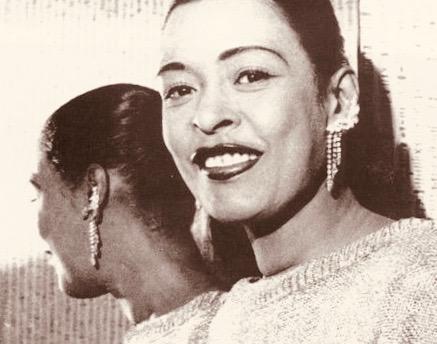James Erskine's documentary on Billie Holiday has feel. Seen in pre-release at the Palm Springs Film Festival, the story could have evaporated into the desert air like a Liberace cadenza. But it grabbed us.
Previous books and screen treatments have soft-pedaled, dramatized or glamorized the gutter aspects of the great singer's life -- maybe out of respect, not wanting to detract from the art. Thanks in part to the vivid audio interview recordings of musicians and Holiday associates collected by the late Linda Lipnack Kuehl and heard for the first time here, though, Erskine gets way down in the sewer. The effect is not to distract, but to root out a deeper understanding of where Holiday's darkly intimate voice came from.
We hear that voice a lot. Where most music docs offer performance snippets, "Billie" showcases quite a few full-length songs (often not commonly available), the visuals colorized and blown up so Holiday's face fills the big screen. Camera master Tim Cragg's grainy textures match the singer's mood, giving us an experience parallel to hearing Holiday on headphones in the middle of the night. Time has passed, and so have players and audiences, but Holiday seems to be singing just to us.
She connects on several levels.
First is her apparent artlessness, devoid of gymnastics -- her range is limited, and she seems only to be thinking out loud, her natural variations on the melody coming off as almost lazy. Although she's a born queen, that accessibility draws us to the throne.
The second connection comes through pain. Even when Holiday sings an uptempo number, her voice carries a shy, bruised quality that is unquestionably real and magnetic. Not everyone knows love, and considering Holiday's series of abusive relationships, maybe she didn't. Everyone knows pain, though, and everyone hides it, whether through booze, drugs, suppression or misdirection.
That's the third attribute we recognize in Holiday: her casual mask and humble smile, the diaphanous curtains through which we share the universal hurt enough to love her, enough to cry, but not enough to scream. We see that she has found a way to live, however briefly.
Erskine overreaches in devoting much of the documentary to Holiday's dedicated chronicler, Linda Kuehl, whose obsession and mysterious 1979 "suicide" could have provided material for a wholly separate project. But we understand the filmmaker's attraction to both women, who died 20 years apart in the prime of life.
Watch for the general release of "Billie," and see it on the biggest screen you can find.
* * *
Chris Willman saw "Billie" at the Telluride Film Festival last year; read his excellent Variety review here.

